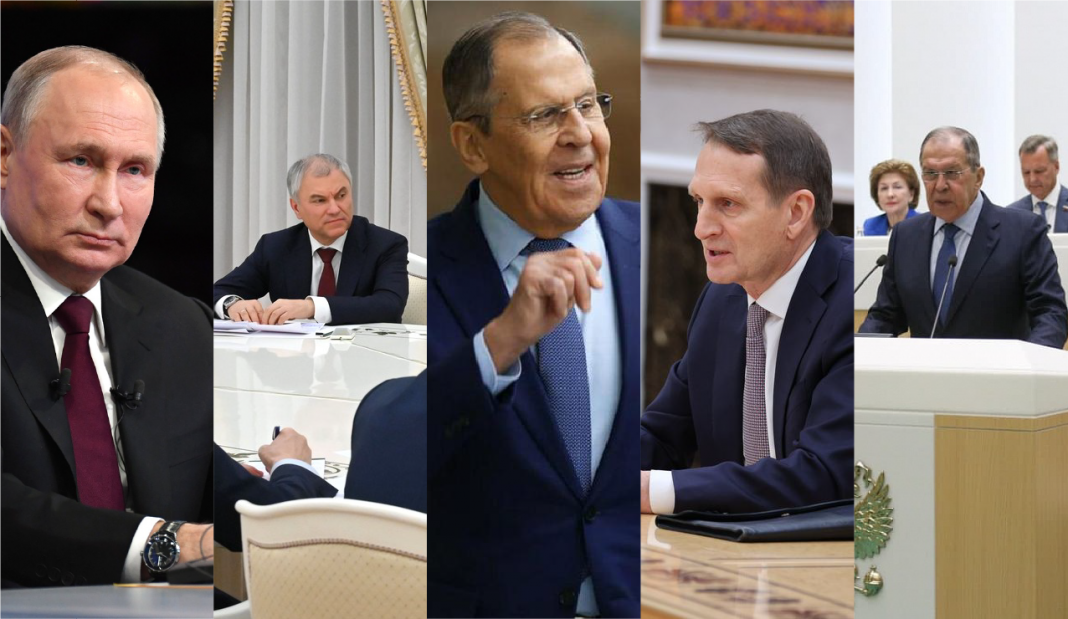This report describes the key events that significantly impacted Russia’s political, economic, and social processes.
Based on the results of the past week, the following trends can be summarised:
- Against the backdrop of the start of the Russian presidential election campaign, it can be stated that ideologically, Putin remains a supporter of social conservatism, focusing on social programs for Russians, traditional values, and strong state power. Serious emphasis was placed on the “Ukrainian issue.” In fact, Putin had something to say: against the backdrop of the latest foreign policy failures of the Ukrainian leadership and the unsuccessful counter-offensive of the Ukrainian Armed Forces, as well as the offensive of Russian troops along the entire front line, Putin tried to look like a winner. He again began to speak in the language of ultimatums and remembered the demands for “denazification” and “demilitarisation” of Ukraine. His messages to the West also stemmed from the fact that the Russian economy was able to show positive results despite the sanctions.
- In his public speeches, Putin increasingly states that Russia has no plans for a war with NATO, and the war going on in Ukraine is a war against NATO expansion to the east. Putin makes it clear that Russia has a sphere of national interests (which includes Ukraine, Belarus, Moldova, the countries of the Caucasus and Central Asia). It is not going to renounce it, but at the same time, Russia does not intend to fight with the Baltic countries, Poland, and other countries of Eastern Europe that are members of NATO. This message is essential as the fundamental basis for a possible negotiation process with the West.
- Notably, from the perspective of Russian foreign policy, Sergei Lavrov’s statements, according to whom the main achievement of the foreign policy department this year is that the international isolation of Russia has not yielded its results and also that Russia has reached a new level of contacts with countries Global South – primarily with India, Brazil, and China. Several caustic remarks towards the European Union and NATO (Lavrov considers them dependent states) underscore the fact that Russia has returned to the rhetoric and propaganda clichés of the Cold War. At the same time, Lavrov is trying to show that Russia remains an independent factor in international politics with its mechanisms of influence on political processes in the world.
This report highlights the following topics that were most relevant for Russia during 11th – 17th of December:
1. Press conference of Vladimir Putin;
2. Meeting of Vladimir Putin with the leaders of factions of the State Duma;
3. Vladimir Putin’s comment to the Rossiya TV channel;
4. Meeting of the boards of the Ministries of Foreign Affairs of Russia and Belarus;
5. Lavrov’s speech during the “government hour” in the Federation Council;
6. Statement by Sergei Naryshkin about the West’s desire to create a virtual “Russian Republic.”
This Content Is Only For Subscribers
- Press conference of Vladimir Putin
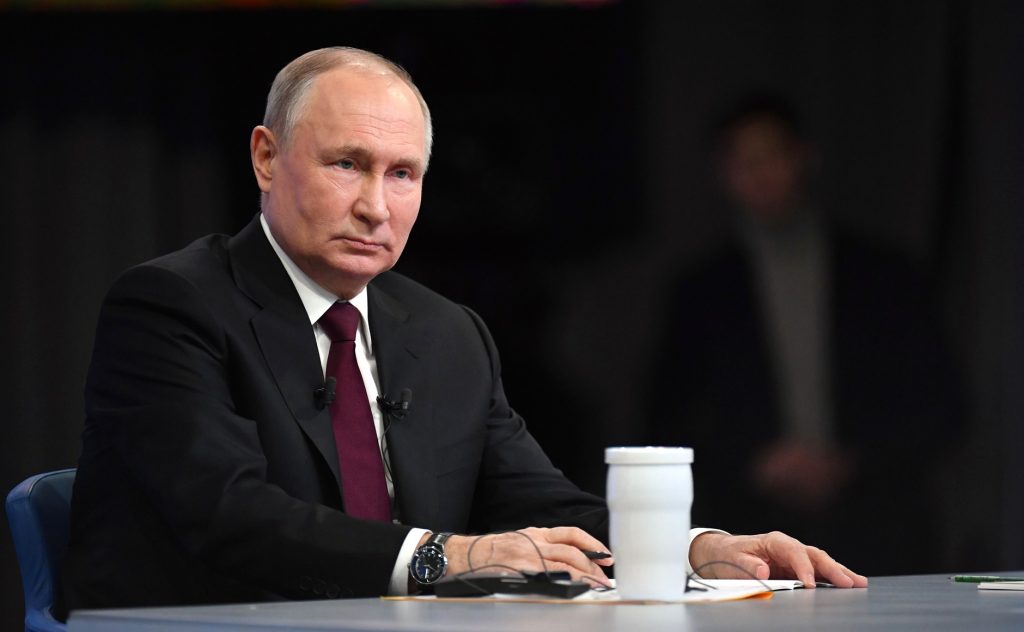
On Thursday, December 14, Vladimir Putin held a press conference in Moscow, during which he summed up the year’s results and answered questions from journalists and spectators. This year, it was decided to combine the format of a direct line with citizens and a large press conference for the media. In the hall of Gostiny Dvor, against the backdrop of yellow-blue screens and constantly updated messages with uncomfortable questions supposedly from Russian citizens, Vladimir Putin repeated many well-known theses about geopolitics, relations with the West, and the war in Ukraine for more than three hours. However, the main part of his thesis was focused on domestic political issues, which was once again demonstrated by the launch of the election campaign.
Key theses:
- “I’ve said this many times already, but it’s repeating not a sin. For a country like Russia, the existence, simply the existence of our country, without sovereignty, is impossible; it simply will not exist. In any case, in the form in which it exists today and in which it has existed for a thousand years.”
- “The most important indicator of economic growth is gross domestic product growth by the end of the year, which is expected to be 3.5 per cent. This is a good indicator; it means that we have recovered from last year’s decline, where we had, in my opinion, 2.1 per cent. If there is a plus of 3.5 this year, it means that we have won back the decline and taken a fairly serious step forward.”
- “Unfortunately, our inflation has increased; by the end of the year, it is expected to reach 7.5, maybe a little more, towards 8 per cent. But the Central Bank and the Government are taking the necessary measures. We can talk about this more; I mean raising the key rate and other measures that the Central Bank and the Government are taking. We assume that we can return to the target indicators.”
- “Industrial production is growing confidently – 3.6 per cent. But what is especially pleasing is that the manufacturing industry is growing – 7.5 per cent for the year. We haven’t had this for a long time.”
- “State external debt is decreasing. It also speaks about macroeconomic stability and financial stability. The national debt decreased from 46 to 32 billion dollars. And private external debt also decreased (our companies regularly repay all loans taken from foreign financial institutions) from 337 billion dollars to 297.”
- “There will be peace when we achieve our goals. Now, let’s return to these goals – they do not change. Let me remind you what we talked about then. About the denazification of Ukraine, demilitarisation, and its neutral status.”
- “Look what is happening in terms of denazification. During the negotiation process, which had a particular stage after the preparation of a draft of a possible agreement, which was recently mentioned by officials in Kyiv, in general, they did not agree that some kind of denazification was needed and said that there was no fascination, the growth of such no mood. Why not? When a national hero is not just a famous nationalist but a Nazi. Bandera was elevated to the rank of national hero. Why not?
- “And when the head of today’s Kyiv administration, in front of the whole world, gives a standing ovation to a former SS soldier who directly participated in the Holocaust, in the extermination of one and a half million Jews in Ukraine, Russians, and Poles, he gives a standing ovation. Is this not a manifestation of Nazism, or what?”
- “Now regarding demilitarisation. If they don’t want to agree, well, then we are forced to take other measures, including military ones. Today, Ukraine no longer produces almost anything; they are trying to preserve something else there, but they produce almost nothing; they bring everything – sorry for the bad manners – they bring everything for free. But this freebie may end someday, and apparently, it is ending little by little. But that’s not even the point. I think they will still give, but destruction is happening. I will not remember these figures for aircraft or air defence systems. They gave them what they were promised: 400 tanks, 420–430. By the way, they gave everything they promised. Everything that the Westerners promised, Ukraine received everything, even more. But we destroyed, just starting with the so-called counteroffensive, 747 tanks. This is the data as of yesterday evening. Almost 2300 armoured vehicles of various classes. This is demilitarisation. Or we will agree on demilitarisation, we will agree on certain parameters, and, by the way, during the negotiations in Istanbul, we agreed on them, but then we just threw these agreements into the oven, but we agreed on them. There are other possibilities, either to come to an agreement or to solve it by force. This is what we will strive for.”
- “Look, we partially mobilised and called 300 thousand people. I believe 244 thousand are located directly in the combat zone, in the [so-called] “North Military District” zone.
- “Perhaps it would be inappropriate to remember Bismarck, but nevertheless, he once served in Russia and lived in Russia, although he became an outstanding German figure. He once said that wars are not won by generals but by school teachers and priests. And that’s right, that’s definitely true.”
- “As for the normalisation of relations [with the European Union], this depends not only on us – we did not spoil these relations: it was the relations with us that were spoiled, and they tried to push us all the time somewhere into the background, the third plan, neglecting our interests.”
- “The conflict that occurred in Ukraine, where did it start? Let’s remember – we won’t regret three or four minutes: it started with the coup in Ukraine in 2014. Before this, we tried at all costs for decades – I want to emphasise this – for decades, we tried to build normal relations with Ukraine. Even after, essentially, a coup d’etat, when Viktor Yanukovych was not allowed to come to power: he won the elections, but a third round was announced. What is this if not a coup d’etat? The Constitution did not provide for any third round. This is a creeping coup d’etat. But okay, we’ve come to terms with that too.”
- “The problem is that I have always said and now [I say], despite all the tragedy of the events that are taking place, at the core, Russians and Ukrainians are a single people. And what is happening now is a huge tragedy, similar to a civil war between brothers, when the brothers found themselves on opposite sides. But to a large extent, they have nothing to do with it.”
- “The entire southeast of Ukraine has always been pro-Russian because these are historically Russian territories. Here, a colleague raises a sign: Türkiye. He knows, in Turkey, they know well: the entire Black Sea region, as a result of the Russian-Turkish wars, went to Russia. What does Ukraine have to do with it? Crimea and the entire Black Sea region have nothing to do [with it]. Odessa is generally a Russian city. We know about this. Everyone knows this well. No, they made up all sorts of historical nonsense.”
- “Okay, once upon a time, Vladimir Ilyich Lenin transferred everything to Ukraine during the formation of the Soviet Union. We came to terms with this after the collapse of the Soviet Union and were ready to live in such a paradigm. But this part – the southeast – is pro-Russian, which was also important for us. They always voted in elections for those who followed the pro-Russian slogans of Ukraine’s domestic and foreign policy. And in general, Russia was quite happy with this.”
- “This, plus the unbridled desire to creep towards our borders, capturing Ukraine into NATO – all this led to this tragedy. Plus, the bloody events in Donbas for eight years. All this led to the tragedy that we are now experiencing. They forced us to take these actions.”
- “In these conditions, when, I say, the United States conceived and organised, and Europe stands and silently looks at it or plays along, sings along with them, how to build relations with them? We are in favour – we didn’t tear anything up. Still, they pretended that they didn’t know anything or remember anything. They only mentioned two or three times that the Minsk agreements were signed for fun and had no intention of being implemented.”
- “Many European figures outwardly behave like General de Gaulle, who fought for the interests of France with arms in hand, collecting everything that the French had to resist the occupiers. But in practice, they behave like Marshal Pétain, who, although he was a hero of the First World War, became a collaborator during the Second World War and submitted to the will of the occupiers.”
- “As for the United States. We are ready to build relationships with them. We believe that the United States is an important and necessary country for the world. But this imperial policy hinders them, not even us – it hinders them. Why? Because in the public consciousness they must behave like an empire, and if they agree on something somewhere or concede to someone on something, this is already perceived by the electorate as some kind of failure or gap. That’s why the elites are forced to behave this way partly.”
- “I would like to note Turkish President Erdogan’s significant, leading role in restoring the situation in Gaza. He is, of course, one of the international community leaders who pay attention to this tragedy and is doing everything to ensure that the situation is changed for the better to create conditions for long-term peace. It is obvious. He is very active in this area. And God bless him. Because what is happening is, of course, a disaster.”
- “First: everything that international officials are doing to Russian sports is a complete contradiction and perversion of the idea of Pierre de Coubertin “Oh sport, you are the world.”
- “We still have a front line. Do you know how long? Almost two thousand kilometres. And, probably – not probably, but absolutely – not everything is delivered on time everywhere. But our own production is growing and is being purchased, including, by the way, privately; a lot is also purchased abroad. And the state, the Ministry of Defense, and industry, of course, are actively working in this direction.”
- “Formally, legally, Russia has no private military companies. They are not provided for by law; that’s the problem. First. Second: contracts by participants in combat operations within the framework of private military companies, as if private military companies were not concluded with the state. This is the main problem. The commanders of these private military companies had one relationship or another with the state. Unfortunately, payments were also made in cash. And this is also a big problem. Now, it is tough to establish even the listed personnel of these military units.”
- “I note with satisfaction that the Government of the Russian Federation manages, despite certain increases in defence spending, in the security sector, to fully fulfil all of our obligations to citizens in their entirety.”
- “As for foreign-made aircraft. Yes, indeed, Pavel [Zarubin] said: we had constant disputes with our companies, which purchased without restrictions – conditionally without restrictions, but nevertheless – too many, in my opinion, foreign-made aircraft, also arguing for this with understandable considerations: engine efficiency, compliance with noise requirements of international organisations, and so on – there are many arguments. But it would be better if they took time to create a market for domestic equipment.”
- “Our level of interaction with the People’s Republic of China is unprecedentedly high. We have often said that we hope to reach a trade turnover of $200 billion next year. We will have it this year – not next year, but this year – over 200 billion. We’ll have to do some calculations in the first quarter of next year – I think the trade turnover will be 220–230 billion.”
- “We see what is happening around both Russia and China. We see attempts by the West to switch NATO activities to Asia and towards Asia, which clearly go beyond the scope of the statutory goals of this organisation – the North Atlantic bloc. It’s called the North Atlantic bloc – what should it do in Asia? No, they drag themselves to Asia, provoke there, escalate the situation, create new military-political blocs with different compositions.”
- “Yes, we had a fairly good, kind working relationship. As you know, I have been to France, Mr. Macron came to Russia. We have always had a busy agenda regarding bilateral relations and international issues. We are ready to continue to interact with France.”
- “We build all our integration plans, I mean Russia, solely based on the voluntariness of all participants in this process and mutual benefit.”
- “You see, in Europe, seemingly in countries that are allies of Ukraine, they block roads and do not allow Ukrainian agricultural products into their territory, even if these products are supposed to be in transit. They closed it, and that’s it. They have their interests, and there is someone to fight for these interests. Where will Moldovans go with these products?”
- “Artificial intelligence, should we be afraid of it? To prevent the development of artificial intelligence, including superintelligence, which begins to feel, which distinguishes smells, which acquires cognitive capabilities, which develops itself – it is simply impossible to prevent this, it is impossible to prevent development. This means that we need to lead; in any case, we need to do everything to be one of the leaders in this direction. But no one knows how this will end. These are the realities, at least today.”
- “Why do we supply to Europe? “Gazprom is a reliable partner; it has contractual obligations, has always fulfilled these contractual obligations, and is now fulfilling them.”
- “The fact that Europe does not receive enough gas is their problem. Oddly enough, they tried to blame it on us, that we weren’t selling something. This is complete nonsense because we didn’t close the Yamal-Europe gas pipeline, Poland did it, we didn’t close the second branch of the gas pipeline through the territory of Ukraine, Ukraine did it, and we didn’t blow up Nord Stream 1, and partly Nord Stream 2”, this was most likely done by the Americans or someone else did it at their instigation. It’s not us who are not opening “Nord Stream 1” because partly, at least half, one pipe is working there – Germany doesn’t do that. He doesn’t do it; he doesn’t want to or need to.”
Outcomes and outlook:
“The main press conference of the year,” as the Russian media have already called it, was, in fact, Putin’s first public appearance after he announced his desire to run for another presidential term. This press conference outlined Putin’s ideology and program for the upcoming five-year presidential term.
Ideologically, Putin supports social conservatism, emphasising social programs for Russians, traditional values, and strong state power. Serious emphasis was placed on the “Ukrainian issue”. Putin had something to say. Against the backdrop of the latest foreign policy failures of the Ukrainian leadership and the unsuccessful counter-offensive of the Ukrainian Armed Forces, as well as the offensive of Russian troops along the entire front line, Putin tried to look like a winner. He again began to speak in the language of ultimatums. He again remembered the demands for “denazification” and “demilitarisation” of Ukraine. His messages to the West also stemmed from the fact that the Russian economy was able to show positive results despite the sanctions.
At the same time, Putin tried to show “concern for ordinary citizens” by resolving relatively minor issues and giving instructions. There was criticism of the Minister of Agriculture, Dmitry Patrushev, and the “head” of the Crimean Autonomy, Sergei Aksenov. Also, the press conference organisers decided to demonstrate that Putin is not afraid of “inconvenient” questions – they were specially displayed on the screen to show the existence of freedom of speech in Russia. From this moment, we can talk about the start of an election campaign in Russia, which will be conducted according to the same rules and in the same organisational framework but adjusted for military themes and wartime features.
- Meeting of Vladimir Putin with the leaders of factions of the State Duma
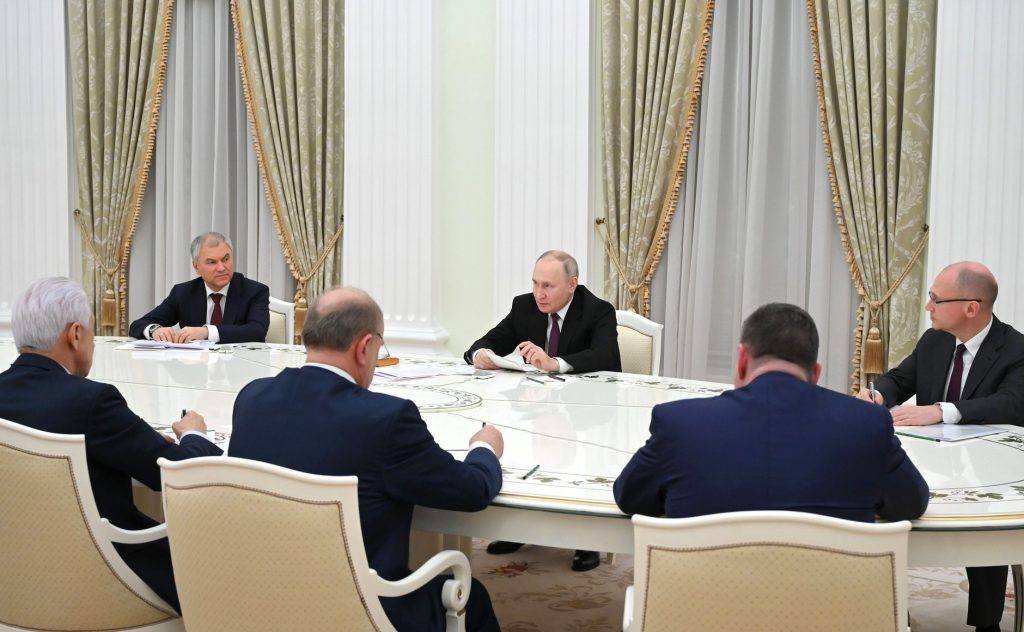
On Friday, December 15, Vladimir Putin held a traditional meeting in the Kremlin with the leaders of factions of political parties in the State Duma. The meeting was attended by the head of the faction of the United Russia party, Vladimir Vasiliev; the head of the Communist Party faction, Gennady Zyuganov; the leader of the faction of the Just Russia – Patriots – For Truth party, Sergei Mironov; the head of the faction of the New People party Alexey Nechaev, the leader of the LDPR faction Leonid Slutsky, as well as Chairman of the State Duma Vyacheslav Volodin and First Deputy Head of the Presidential Administration Sergei Kiriyenko.
Key theses:
- Putin: “At the beginning of our traditional meeting, I would first of all like to once again congratulate you on the 30th anniversary of the Russian Constitution.”
- Putin: “It is very pleasant that – and this is also very important – today’s parliament is certainly the successor to everything that was done on the path of parliamentarism in our country at the beginning of the twentieth century. But I would like to say that I think, in any case. Many people think that, in fact, in our country, these principles of parliamentarian and the very ideas of democracy themselves took shape, of course, much earlier – you still need to look at the Novgorod veche.”
- Putin: “I would like to separately thank all of you, your colleagues, for your hard legislative work. A lot has been done. This is especially important at such turning points in history as today because it is necessary to make informed and balanced decisions, but they must be made quickly.”
- Putin: “The election campaign is ahead. I consider it necessary to outline several fundamental positions. Firstly, everything must happen on a competitive basis and in full compliance with the laws of the Russian Federation.”
- Zyuganov: “I am satisfied that you said about the [so-called] “SMO” that the main issues will be resolved because peace can only come when we liberate “Ridnaya” Ukraine from Nazism, fascism and Banderaism and achieve those goals which are delivered and deeply formulated, illuminated in your messages and attitudes. This is a matter of our, I believe, historical survival.”
- Zyuganov: “The Chairman of the Duma [Vyacheslav Volodin] introduced a new practice in the Duma. Over the past year, we have probably made about a dozen visits to leading teams, the best scientific and technical institutions – a unique experience.”
- Zyuganov: “Artificial intelligence: Gref is trying to return artificial intelligence to all of us here, but at the first meeting, I told him: “If your intelligence falls into the hands of evil, ignorant, bad people, it will only be used for evil.” Let’s start with teaching, raising, and supporting children.”
- Slutsky: “Literally shortly, the largest four-deck ship on inland waters, whose name will be Vladimir Zhirinovsky, will leave the slipways of the Lotos plant in the Astrakhan region.” Many thanks to the shipowner Roman Viktorovich Trotsenko and those who supported us.”
- Slutsky: “As for the election campaign, which is important for society and is, probably, without unnecessary pathos, historical, taking into account the specifics of the moment, with your permission, we will talk separately. “I would ask today for a tete-a-tete exchange on various, more delicate issues.”
- Slutsky: “Demography is the same issue of civilisational importance. We must again become a country of large families. We have several dozen offers. I just came to this meeting without documents. I believe now is not the time to load you with any documents; we will do this at the Government level.”
- Slutsky: “Vladimir Vladimirovich, the LDPR is developing. We are working shoulder to shoulder for a speedy victory and the tasks facing the country and the Russian world. Once again, thank you very much for helping us honor the memory of Vladimir Volfovich, and for your constant prompt response, despite your enormous workload, to our ideas and proposals.”
- Mironov: “On the eve of the 80th anniversary of the victory of the Soviet people in the Great Patriotic War, it may make sense to create a special commission in the Interparliamentary Assembly to write a single textbook on the history of the Great Patriotic War for all CIS countries under the code name “Victory in the Great Patriotic War” – one for all”.
- Mironov: “I would like to say a few words about migration policy. You spoke very well about this on Direct Line, knowing that such a problem exists. Look, the regions are already making certain decisions, such as prohibiting migrants from working in certain areas. Such local laws have been adopted in the Kaliningrad, Kaluga, Tyumen, and Chelyabinsk regions and the Khanty-Mansi Autonomous Okrug. This is an absolutely correct approach, and we must go this way.”
- Nechaev: “They say that this was the most difficult budget, the most difficult during the State Duma. But I also want to say that, together with other factions, we redistributed about 139 billion rubles for medicine and healthcare. There was a general consensus that it was impossible to save on this and protect the country’s interests: in defence, in the military sphere, in the military-technological sphere.”
Outcomes and outlook:
It is an absolutely ritual action that should show the absence of confrontation between the president and the main political forces of Russia represented in the State Duma. The main goal is to demonstrate that Putin has no competitors or opponents and that all political forces and individual party leaders have rallied around the leader; the differences between parties are purely tactical and not strategic.
- Vladimir Putin’s comment to the Rossiya TV channel
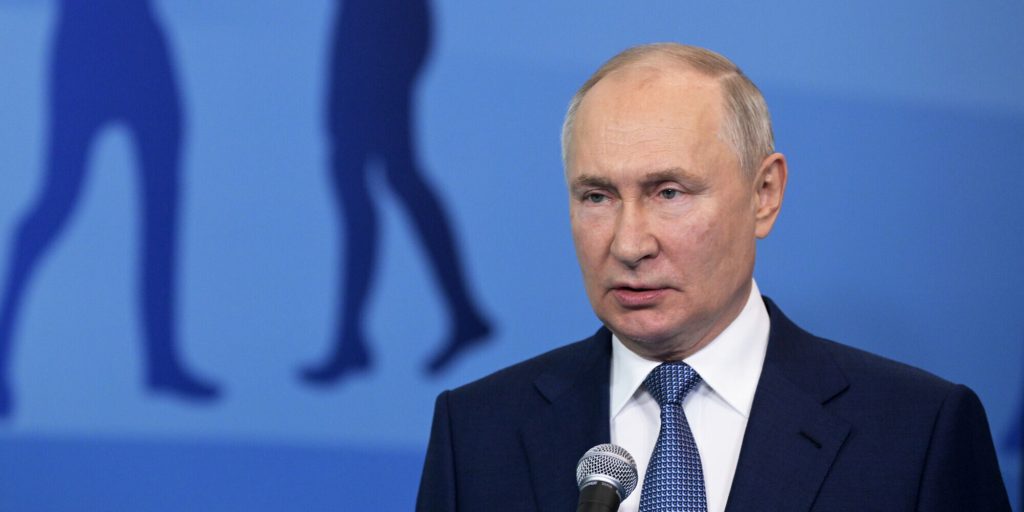
On Friday, December 15, on the sidelines of the Second Railway Forum, Vladimir Putin answered a question from journalists regarding a possible conflict with NATO. According to the Russian president, such options are not even considered.
Key theses:
- “This is complete nonsense. I think President Biden understands this. This is just a figure of speech to justify their erroneous policy in the Russian direction.”
- “I don’t think that today, in terms of global development, the United States is interested in inflicting a strategic defeat on Russia. I don’t think this is in the United States’ interests.”
- “The president of any large country, a NATO country, and even more so the only owner of NATO, and the United States is the owner of NATO – this is their backyard, cannot but understand that Russia has neither territorial claims nor any other interest in fighting with countries NATO”.
- “We have no territorial claims with them, no desire to spoil relations. We are interested in developing relations.”
Outcomes and outlook:
Putin’s interview is like a message to Western elites. This is a signal: Russia has no plans for a war with NATO, and the war going on in Ukraine is a war against NATO’s expansion to the east. Putin makes it clear that Russia has a sphere of national interests (which includes Ukraine, Belarus, Moldova, the countries of the Caucasus and Central Asia). It is not going to renounce it, but at the same time, Russia does not intend to fight with the Baltic countries, Poland and other countries of Eastern Europe that are members of NATO. This message is critical as the fundamental basis for a possible negotiation process with the West. According to our data, the West, for a long time, demanded from Russia a clear articulation of the goals of military operations and guarantees of non-aggression against NATO states. This interview has just such a purpose. Obviously, it precedes crucial points in the negotiation process between Russia and the West.
- Meeting of the boards of the Ministries of Foreign Affairs of Russia and Belarus
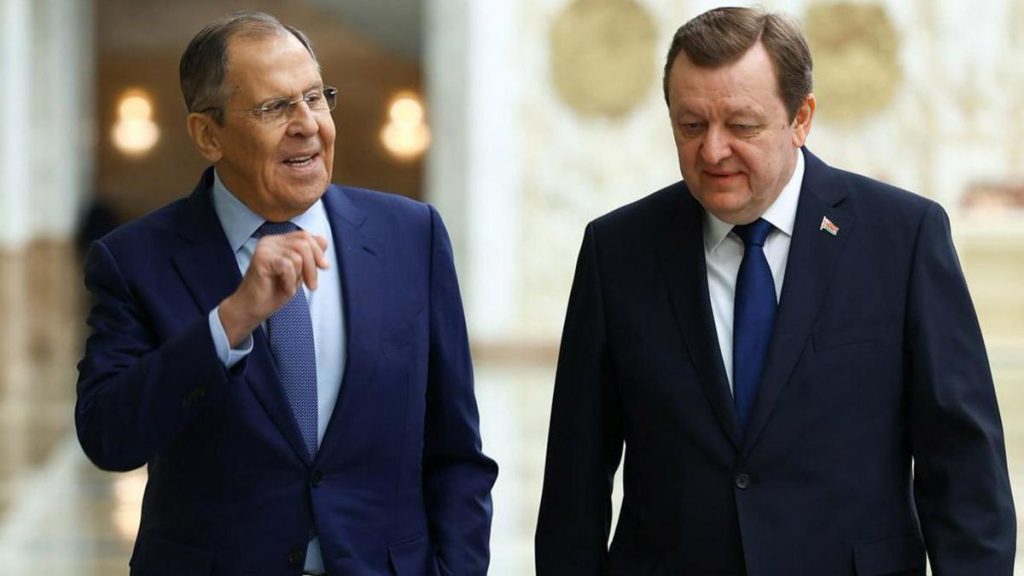
On Friday, December 15, a meeting of the boards of the Russian Ministry of Foreign Affairs and the Ministry of Foreign Affairs of Belarus was held in Moscow, in which the heads of departments of the two countries, Sergei Lavrov and Sergei Aleynik, as well as representatives of the delegations, took part. During the meeting, the parties summed up the results of bilateral relations and also discussed opportunities for their further strengthening and integration.
Key theses:
- Lavrov: “The Republic of Belarus is our closest strategic partner and ally. The unique format of joint meetings of the boards of the foreign affairs agencies of the two fraternal countries is a clear confirmation of this. We have been holding them every year since 2000.”
- Lavrov: “At the last meeting of the boards, they adopted a Resolution, in the implementation of which special attention was paid to joint work in the areas of foreign policy planning, arms control, and countering the Western line of politicising multilateral platforms. We continued to act from a coordinated position regarding the European Union, NATO, and the Council of Europe.”
- Lavrov: “Today’s agenda is rich and in some ways even innovative. It is completely oriented towards the Global South and the Global East – towards the World Majority. To countries that are open to cooperation on the basis of equality and mutual benefit, without ultimatums, threats (and especially sanctions). This agenda reflects the further adaptation of the foreign policy priorities of Russia and Belarus to current geopolitical realities.”
Following the meeting, Sergei Lavrov and Sergei Aleynik took part in a joint press conference, during which they answered several questions:
- Lavrov: “We have just signed a new Program for 2024-2026. It will guide action for the next three years. It maintained continuity with previous documents and confirmed the priority of the task of diplomatic support of integration processes within the Union State. At the same time, we reflected the need to significantly increase priorities in our foreign policy work in areas related to the countries of the World Majority – the Global South and the Global East.”
- Lavrov: “We will coordinate our approaches in every possible way within the SCO, where Minsk will join as a full member in 2024. We welcome the interest of Belarusian friends in BRICS activities. They also have their plans. We are ready to help expand the Republic of Belarus’s contacts with associations with which Russia has long established partnerships, particularly ASEAN. We intend to continue closely coordinating our actions in the UN, OSCE, CICA and in general in the direction of the Eurasian continent-wide architecture of security and interaction.”
- Lavrov: “Our common opinion is that the decisions taken today will contribute to the further strengthening our cooperation and the growth of the international authority of the Union State. With State Secretary Mezentsev’s participation, integration construction issues were discussed. We considered the schedule of upcoming contacts at the highest and highest levels, meetings of other bodies of the Union State.”
- Lavrov: “As for the talk that it’s time to reduce aid to Ukraine, we hear them. It’s not just talk. Specific difficulties are already arising in both Europe and the United States with the search for “free money” to continue supporting the Zelensky regime. He clearly did not live up to expectations and was unable to play the role of an instrument to undermine the security of the Russian Federation, to destroy our common history, culture, and everything Russian in the territory that this regime continues to control. You hear assessments coming from sober-minded politicians in NATO and the European Union. Better late than never. It’s time for them to realise the complete deadlock of the war they started with the hands of the Zelensky regime against the Russian Federation.”
- Lavrov: “About attempts to conduct some kind of negotiations. They have “seven Fridays a week.” They tell lies and do not blush. When they broadcast and continue to declare out of inertia that they will not discuss anything about Ukraine without Ukraine, they are being hypocritical. It’s not like that at all. (I don’t want to name and have no right to name names). Several high-ranking leaders of Western countries, including one leader of a well-known Western country, sent signals several times through different channels (at least three different channels), saying, why don’t we meet and talk about what to do with Ukraine and European security. Three times. Although this “figure” has direct access to his colleague in Moscow. We have seen such “tricks” over the past six months.”
Outcomes and outlook:
The joint meeting of the Boards of the Ministries of Foreign Affairs of the Russian Federation and the Republic of Belarus was supposed to show successes and shifts towards building the Union State and a unity of opinions on critical issues of international politics.
By and large, Sergei Aleynik never demonstrated a desire to enter into confrontation with Russia (unlike his predecessor Vladimir Makei). Therefore, the joint speech turned into political information about the peculiarities of the current moment. The only nuance is that Sergei Lavrov criticised Alexander Lukashenko’s utopian proposal regarding mediation in resolving the conflict between Ukraine and Russia. That is, Belarus pointed out that it is not a key player in the post-Soviet space. The topic of possible threats from the West for Belarus was raised again. This topic has been constantly exploited over the past year.
- Lavrov’s speech during the “government hour” in the Federation Council
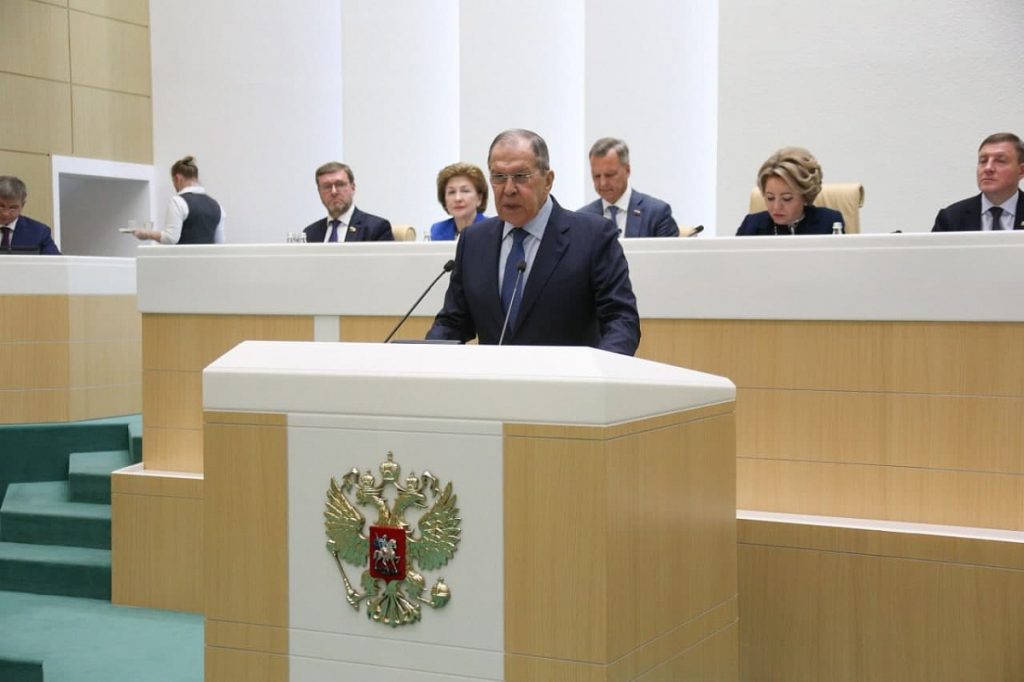
On Wednesday, December 13, Russian Foreign Minister Sergei Lavrov took part in a meeting of the Federation Council of the Russian Federation, where during the “government hour”, he answered several questions regarding Russian foreign policy and also spoke about plans for the following year.
Key theses:
- “We will continue to facilitate all endeavours in the field of parliamentary diplomacy fully – by using bilateral contacts with foreign partners or participation in multilateral forums through the CSTO, CIS, BRICS, G20, UN, Inter-Parliamentary Union and other platforms.”
- “Since our last meeting in December 2021, the situation in the world has not become any easier. Much of what is bad is rooted in the insatiable desire of Washington and a small group of countries sworn to it to impose their vision of “everything” on the entire world. Hence, all the notorious concepts, such as “order based on rules,” and the division of all states into democracies and autocracies. The meaning of such constructions is obvious, simple and not hidden: to ensure for ourselves, that is, the West, a privileged position and continue to solve the problems of its development at the expense of others. In this case – at the expense of the World Majority. Westerners are still not ready for fair, equal interaction with other countries.”
- “It is not easy for our ill-wishers to realise that the bet on a sanctions blitzkrieg against the Russian economy has completely failed. Therefore, those who launched a hybrid war against us do not admit their mistakes and are trying to use new illegitimate tools to “drain” Russia (as they say), cherishing the dream of eliminating our country as an independent geopolitical entity.”
- “The course to isolate Russia has failed. Numerous contacts of President Putin with his foreign colleagues show that our responsible line, based on the principles of the UN Charter, enjoys the broadest support of the countries of the World Majority.”
- “Against the background of positive trends reflecting the objective process of forming a truly polycentric, fair world order, the western part of the Eurasian continent is plunging deeper into a political, socio-economic and ideological crisis. Under the dictates of Washington, the countries of the European Union are losing their independence and breaking off mutually beneficial ties with Russia, which for many decades helped ensure their economic well-being. For the sake of loyalty to the hegemon, they deprive themselves of the colossal comparative, competitive advantages given to our common space by history. To justify the disastrous Russophobic course, a frontal attack on common history has been launched. As part of the hybrid war waged against Russia in several European countries, primarily in Poland and the Baltic states (but not only), following the Kyiv regime, Hitler’s collaborators were glorified. Monuments to Soviet liberating soldiers are demolished. For many years we have been fighting the falsification of history, including within the framework of the UN General Assembly, where we annually introduce a draft resolution on combating the glorification of Nazism, which enjoys the support of the overwhelming majority of the world community, except for the “collective West.”
- “According to our data, the West and the current Israeli leadership do not want the unification of Gaza with the West Bank, as required by the decision to create a state. To our great regret, despite the appeal of Russia and many other countries of the world community, they do not stop the creation of Jewish settlements in the West Bank, including East Jerusalem, in territories that under all circumstances should become an integral part of the Palestinian state. You probably see from the reports that settlers very often behave extremely aggressively. In East Jerusalem alone, 1,800 new settlements have recently been approved. They will, by and large, be built in the Palestinian territories.”
- “Let me emphasise again. We will never agree to any agreements that will “undercut” and infringe on the security of Israel. We are convinced that it can only be ensured in accordance with UN decisions, which presuppose and demand that next to this state, also in security and good neighbourliness with each other and with all adjacent countries, an independent and independent state of Palestine should live and develop.”
Outcomes and outlook:
Sergei Lavrov summed up the year for Russian diplomacy. The Russian Foreign Ministry considers the main achievement to be that Russia’s international isolation has not yielded results and that Russia has reached a new level of contact with the countries of the Global South – primarily with India, Brazil and China. Several caustic remarks towards the European Union and NATO (Lavrov considers them dependent states) underscore the fact that Russia has returned to the rhetoric and propaganda clichés of the Cold War. At the same time, Lavrov is trying to show that Russia remains an independent factor in international politics with its mechanisms of influence on political processes in the world.
- Statement by Sergei Naryshkin about the West’s desire to create a virtual “Russian Republic.”
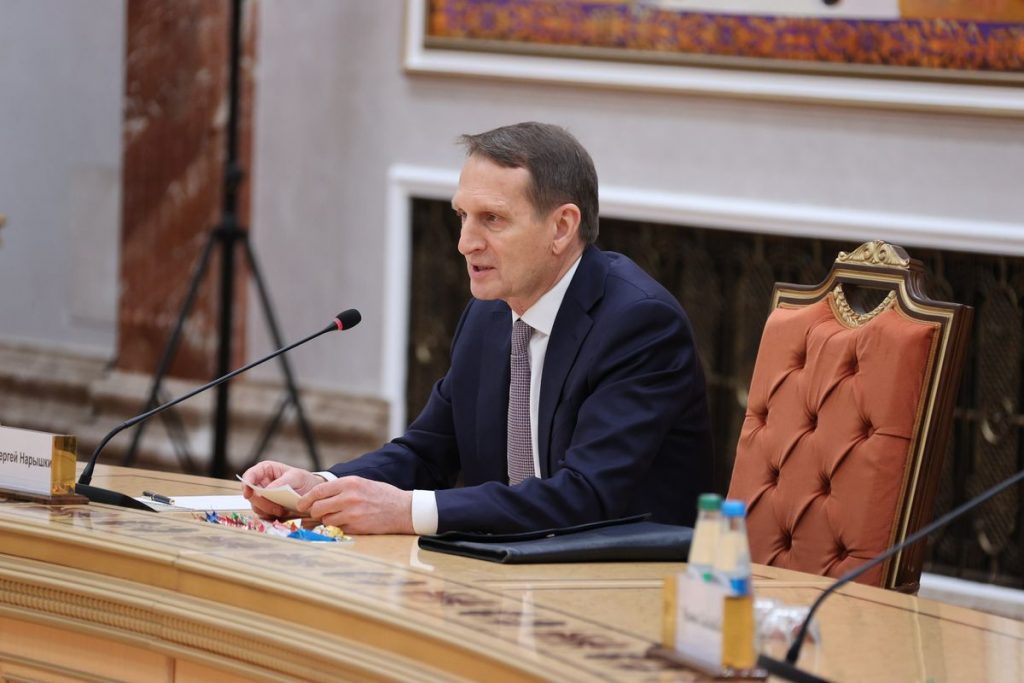
On Thursday, December 14, the 19th meeting of the Meeting of the Heads of Security Agencies and Intelligence Services of the CIS Member States took place in Minsk. In particular, the participants had a meeting with the President of Belarus, Alexander Lukashenko. Also, they discussed current events in the post-Soviet space and plans for the following year.
At the same time, the head of the Foreign Intelligence Service of the Russian Federation, Sergei Naryshkin, stated in his report that the US CIA intends to create a virtual “Russian Republic” abroad: “The absurdity of the situation has reached the point that the CIA is working on a project to create a virtual and allegedly a legitimate state, the so-called Russian Republic, headed by some kind of temporary administration.”
Naryshkin noted that on the eve of the presidential elections in Russia, the West is focusing on the consolidation of the controlled Russian opposition abroad according to the general patterns of the State Department with the participation of the CIA, as well as on the creation of a network of underground anti-government cells inside Russia.
Outcomes and outlook:
Naryshkin’s statements are founded on information from marginal “opposition” groups that have focused their activities on trying to extract additional funding from Western donor organisations. Some representatives of the Russian pseudo-opposition are indeed hatching the idea of proclaiming a “Russian republic” and a “government in exile”, trying to convince Western states of the need to recognise their legitimacy – according to the “Tikhanovskaya 2.0” scenario. However, so far these projects exist only on paper and are not seriously considered by the leading political players (USA, Britain, France, Germany).

